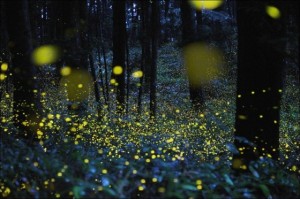Fireflies
I’ve been fascinated by fireflies since I first saw them near Houston, Texas when I was 7 years old. My aunt Joan took me out to her backyard acreage for a treat, not telling me in advance what I was going to see. That was ::cough!:: 40 years ago, so I may not remember details exactly, but I vaguely remember sitting on a 3-person canopy swing with my mom and Aunt Joan at dusk, and being fascinated by the little light show that was starting to twinkle and blink. I don’t think there were many, which isn’t surprising since fireflies mostly reside in the eastern states, but there were enough to start a lifelong love. I was enamored!
I’m worried, as I keep reading that firefly populations are dwindling, and may one day be nonexistent. It hurts my heart. I’m a native Californian, and although we supposedly have a smattering of fireflies somewhere in this state (don’t ask me where, as I’ve never seen one here), I’ve longed for years to live in a place where they’re common. I’ve heard we have glow worms – which, again, I haven’t seen, but they don’t really count because they don’t illuminate fields like runaway Christmas lights.
Some theories as to why fireflies are disappearing are development, light pollution, and pesticides. Development replaces firefly habitats with homes and businesses, obviously. Light pollution prevents mating by dulling the signals male and female fireflies use to find one another (the loneliness!). Pesticides just plain kill them (thanks, Monsanto).
This website can tell you more about the disappearing firefly, and how you can help populations in your area (unless you’re in California, eh?) recover: Firefly: Enigmatic, Enchanting, Endangered
If you have leaf litter in your yard, keep it rather than dumping it. Set aside a space in your yard for it, or start a compost pile. Same with rotting logs, where some species of larvae develop.
Turn off the outdoor lights so the little sweeties can locate each other and get it on.
Avoid chemical pesticides. They’ll eventually kill you, too.
Protect wet areas like streams, ponds and lakes from chemicals, and consider adding water features to your property. If mosquitoes are a problem, look for firefly-safe methods of controlling them, like mosquito larvaecides.
Avoid firefly bits and pieces by not over-mowing your lawn. Give them time to develop and mature between mowings. Also, consider plantings of long grasses, a preferred habitat.
And, please, spread the word. If there’s anything worth getting activist about, it’s these sparkly little beauties! Talk to your neighbors, talk to your city council, make informative fliers, or even host an information-packed firefly party at which everyone requires a light-up hiney (hey, just an idea)!
All that said, my family is considering a move away from firefly-free California (for many reasons) to an area where they still somewhat abound… perhaps central Indiana. And while we may try catching them in jars just for the experience, we will indubitably set them free in hopes they’ll go make more!
And here I’ll leave you with a magical video…

